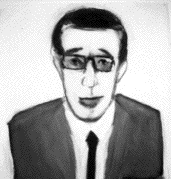
TWO INTRODUCTIONS
 |
| Portrait by Greta Gunderson |
Why not start with the beginning: Jim’s titles. They’re all short, always nice, never heavy. They’re punchy – "Flat Like That" – they are filled with suspicion as we all are today – "Undercurrent Incorporated," "Duet for Spies." They give you their names but deny them – not just "The Mistake" but "The Wrong Mistake," a correct adjective-and-noun construction. Or "Alone Together."
And (oh dear, never start a sentence with “And”!) these plays are built out of words we hear or overhear or might even read in the newspaper every day, any day, on the street, on the radio, even in movies which take them from the street too. Ordinary words that we all know, sometimes combining two of them to make something new and strange — "situationality," nice word, less heavy than it seems, slathering round on your tongue like two or three ice cream flavors blended and melting together.
There are no well-rounded, separate people here. Their words are picked up from all around, attached to no events, no plots worldwide or local or family, no people we know, and yet we know them all. Like you and myself, they’re not characters but are all trying to figure out who they are or who they’re supposed to be. They don’t interact exactly but their words do. They don’t DO, don’t much WANT anything. They don’t laugh at each other, don’t exactly hate each other, their words bypass each other like cars on the highway, with a mere accidental wave of the hand out the side window.
It’s all out of daily life, not a part of a whole called daily life but collected from the familiar pavements of daily life. All that’s gone is what holds it together in regular plays – context they call it. “Actors” if you want to call them that are pretending to be persons, persons to be actors, but they have no names, have abolished the difference between who they are and who they want to be or are supposed to be, today, yesterday, tomorrow, it’s all the same. They’re entrepreneurs, marketing a world they invent as they go along. Go with them. Put your hand in your pocket. You might find a chip in it. Place a bet. You might win.
What first attracted me to Jim Neu's work was that it made me laugh. I was watching The Floatones, a cabaret piece about a self-help singing group, and the oddball, elliptical lines delivered by the three actors, in deadpan style, had me and everyone else in the audience, hysterical. Later, I came into that show as a performer: the fourth Floatone, and soon after I began directing his plays.
During the last ten years, I've directed about ten Jim Neu plays in twenty or more productions and one of the qualities that most attracts me to his writing is its generosity. His characters are vulnerable, even wounded, but they are always too aware of their own foibles to be pitiable. In Avenue X, which takes place on a subway platform, a woman talking to a stranger describes herself before she discovered the pleasure of subways: "I hardly knew me. I acted so much like other people, I couldn't tell me apart." A singer in The Floatones explains, "My life felt like a movie where everything happens off-screen. I knew it would go on without me, but it seemed to be going on without me already."
The eccentrics who inhabit Jim's world - post cold war spies looking for work, Hollywood extras glamorizing the past, a devotee duped by her guru into posing for a religious calendar wearing nothing but "a look of devotion," a proselytizing Laundromat habitué who deifies Barbara Stanwyck, an ad exec trying to find meaning selling laundry detergent – are all struggling in creative ways to cope with a dehumanizing, media-inspired culture – and they nearly always succeed.
Jim Neu has a unique theatrical voice, which blends social satire, cinematic references and contemporary anxiety in a most hilarious way.
* * * * * *
Jim Neu died July 19, 2010 of lung cancer. Read his obituary in The New York Times.
To add
your own photographs or comments go to Jim Neu's Memorial Website at:
http://memorialwebsites.legacy.com/jimneu
For upcoming
tributes, please visit: CURRENT & UPCOMING.
* * * * *








